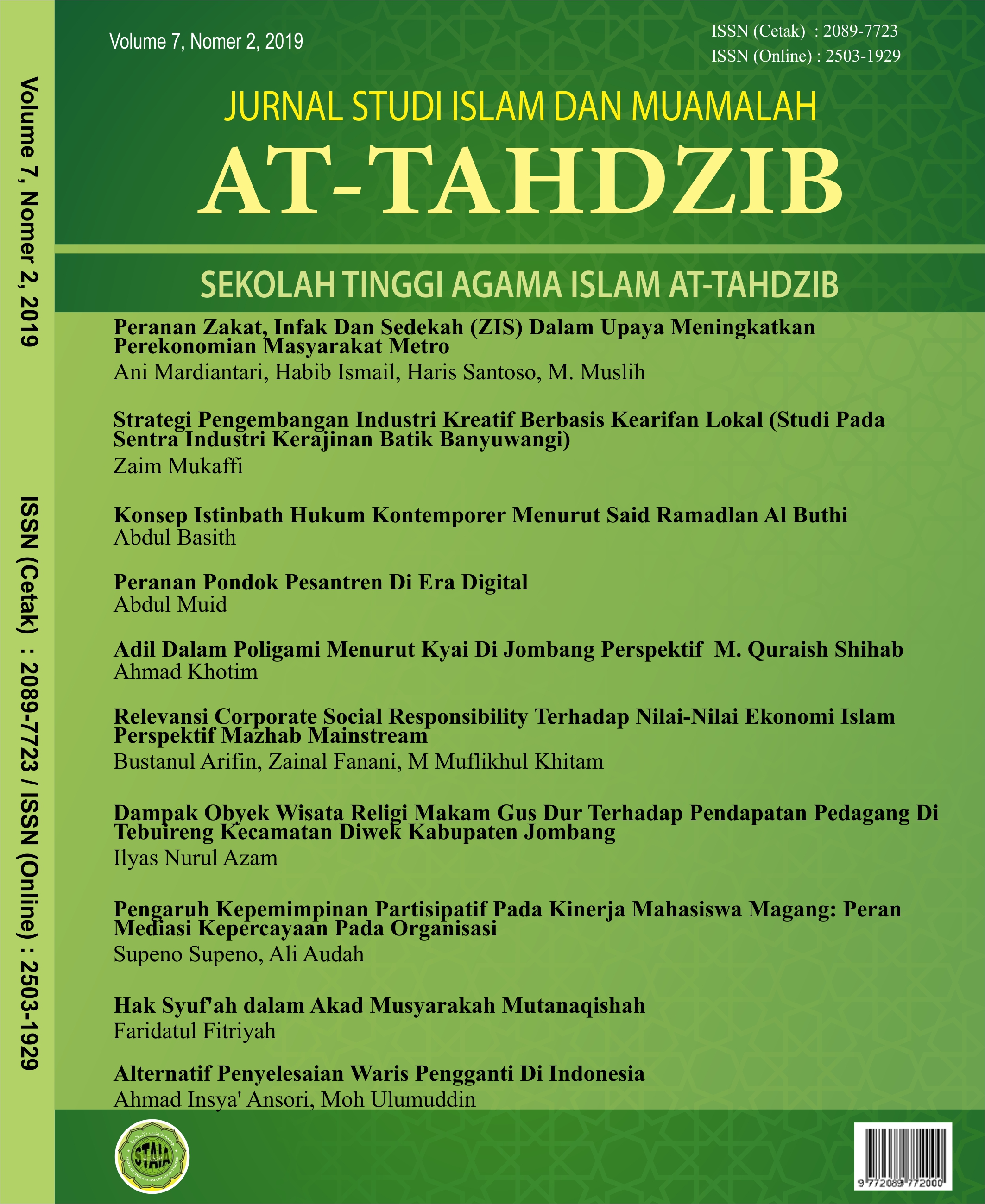Pengaruh Kepemimpinan Partisipatif Pada Kinerja Mahasiswa Magang: Peran Mediasi Kepercayaan Pada Organisasi
Abstract
Research involving final-year students’ university internship on Islamic High School for three months. Students completing measure instruments that developed by researcher. Data covered used to test of direct and indirect effect of participative leadership toward task and contextual performance with mediation of affective and cognitive-trust in leader. Result of analysis shows participative leadership, affective and cognitive-trust in leader simultaneously has positive influence toward task and contextual performance. Participative leadership partially has positive influence on both task and contextual performance as well as on affective and cognitive-trust in leader. Affective-trust in leader partially has positive influence on task performance. Direct effect of participative leadership on task performance was bigger from indirect effect by affective-trust in leader, and total effect was bigger from direct effect. Influence of participative leadership on task performance unmediated by affective-trust in leader. Because contextual performance uninfluenced by affective-trust in leader, so affective-trust unmediated for influence of participative leadership on contextual performance. Because no influence of cognitive-trust on task and contextual performance, so cognitive-trust unmediated for influence of participative leadership, both on task or contextual performance. Research finding would discuss in students internship context.
References
Beenen, G., & Rousseau, D. M. (2010). Getting the most from MBA internships: Promoting intern learning and job acceptance. Human Resource Management, 49, 1, 3–22.
Borman, W. C., & Motowidlo, S. J. (1997). Task performance and contextual performance: The meaning for personnel selection research. Human Performance, 10, 99–109.
Campbell, C. H., Ford, P., Rumsey, M. G., & Pulakos, E. D. (1990). Development of multiple job performance measures in a representative sample of jobs. Personnel Psychology, 43, 277–300.
Chua, R. Y. J., Ingram, P., & Morris, M. W. (2008). From the head and the heart: Locating cognition– and affect–based trust in managers’ professional networks. Academy of Management Journal, 51, 436−452.
Colquitt, J. A., LePine, J. A., Piccolo, R. F., & Zapata, C. P. (2012). Explaining the justice–performance relationship: Trust as exchange deepener or trust as uncertainty reducer? Journal of Applied Psychology, 97, 1–15.
D’Abate, C. P., Youndt, M. A., & Wenzel, K. E. (2009). Making the most of an internship: An empirical study of internship satisfaction. Academy of Management Learning and Education, 8, 4, 527–538.
De Jong, J.P.J., & Den Hartog, D.N. (2007). How leaders influence employees’ innovative behaviour. European Journal of Innovation Management, 10, 1, 41–64.
Detert, J.R., & Burris, E.R. (2007). Leadership Behavior and Employee Voice: Is the Door Really Open? The Academy of Management Journal, 50, 4, 869–884.
Dirks, K. T., & Ferrin, D. L. (2002). Trust in leadership: Metaanalytic findings and implications for research and practice. Journal of Applied Psychology, 87, 4, 611–628.
Djibo, I. J. A., Desiderio, K. P., & Price, N. M. (2010). Examining the role of perceived leader behavior on temporary employees’ organizational commitment and citizenship behavior. Human Resource Development Quarterly, 21, 4, 321–342.
Hon, A. H . Y., & Lu, L. (2010). The mediating role of trust between expatriate procedural justice and employee outcomes in Chinese hotel industry. International Journal of Hospitality Management, 29, 669–676.
Hornung, S. D., Rousseau, J., & Glaser, J. (2009). Why supervisors make idiosyncratic deals. Journal of Managerial Psychology, 24, 8, 738–746.
Huang, X., Lun, J., Liu, A., & Gong, Y. (2010). Does participative leadership enhance work performance by inducing empowerment or trust? The differential effects on managerial and non–managerial subordinates. Journal of Organizational Behavior, 31, 1, 122–143.
Jarvenpaa, S. L., & Leidner, D. E. (1999). Communication and trust in global virtual teams. Organization Science, 10, 6, 791–815.
Kabasakal, H., & Bodur, M. (2007). Leadership and culture in Turkey: A multifaceted phenomenon. Culture and leadership across the world: The GLOBE book of in–depth studies of 25 societies, 835–874.
Lam, T., & Ching, L. (2006). An exploratory study of an internship program: The case of Hong Kong students. Hospitality Management, 26, 336–351.
Liu, W., Lepak, D. P., Takeuchi, R., & Sims, H. P. (2003). Matching leadership styles with employment modes: Strategic human resource management perspective. Human Resource Management Review, 13, 127–152.
Mayer, R. C., Davis, J. H., & Schoorman, F. D. (1995). An integrative model of organizational trust. Academy of Management Review, 20, 3, 709–734.
McAllister, D. J. (1995). Affect- and cognition-based trust as foundations for interpersonal cooperation in organizations. Academy of Management Journal, 38, 1, 24–59.
Mellahi, K., & Collings, D. G. (2010). The barriers to effective global talent management: The example of corporate élites in MNEs. Journal of World Business, 45, 2, 143–149.
Motowidlo, S. J., Borman, W. C., & Schmit, M. J. (1997). A theory of individual differences in task and contextual performance. Human Performance, 10, 71–83.
Newman, A., Rose, P. S., & Teo, S. T. T. (2016). The role of participative leadership and trust–based mechanism in eliciting intern performance: Evidence from China. Human Resource Management, 55, 1. 53–67.
Rempel. J. K.. Holmes, J. G., & Zanna. M. D. (1985). Trust in close relationships, Journal of Personality and Social Psychology, 49, 95–112.
Robinson, S. L. (1996). Trust and breach of the psychological contract. Administrative Science Quarterly, 574–599.
Rothman, M. (2003). Internships: Most and least favoured aspects among a business school sample. Psychological Reports, 93, 3, 921–924.
Sauer, S. J. (2011). Taking the reins: The effects of new leader status and leadership style on team performance. Journal of Applied Psychology, 96, 3, 574−587.
Schaubroeck, J., Lam, S. K., & Peng, A. C. (2011). Cognitionbased and affect–based trust as mediators of leader behavior infl uences on team performance. Journal of Applied Psychology, 96, 4, 863–871.
Thornton, G. C. III., & Gibbons, A. M. (2009). Validity of assessment centers for personnel selection. Human Resource Management Review, 19, 169–187.
Thunnissen, M., Boselie, P., & Fruytier, B. (2013). A review of talent management: Infancy or adolescence? International Journal of Human Resource Management, 24, 9, 1744–1761.
Wang, S., Tomlinson, E. C., & Noe, R. (2010). The role of mentor trust and protégé internal locus of control in formal mentoring relationships. Journal of Applied Psychology, 95, 358–367.
Yang, J., & Mossholder, K. W. (2010). Examining the effects of trust in leaders: A bases–and–foci approach. Leadership Quarterly, 21, 1, 50–63.
Yang, J., Mossholder, K. W., & Peng, T. K. (2009). Supervisory procedural justice effects: The mediating roles of cognitive and affective trust. Leadership Quarterly, 20, 2, 143–154.
Zhao, H., & Liden, R. C. (2011). Internships: A recruitment and selection perspective. Journal of Applied Psychology, 96, 1, 221–229.
Zhu, W., Newman, A., Miao, Q., & Hooke, A. (2013). Revisiting the mediating role of trust on transformational leadership effects: Do different types of trust make a difference? Leadership Quarterly, 24, 1, 94–105.
Copyright (c) 2019 At-Tahdzib: Jurnal Studi Islam dan Muamalah

This work is licensed under a Creative Commons Attribution 4.0 International License.

Jurnal Studi Islam by At-Tahdzib is licensed under a Creative Commons Attribution 4.0 International License.
Based on a work at http://ejournal.kopertais4.or.id/mataraman/index.php/tahdzib





